by pmj
NOTICE: THIS WORK MAY BE PROTECTED BY COPYRIGHT
YOU ARE REQUIRED TO READ THE COPYRIGHT NOTICE AT THIS LINK BEFORE YOU READ THE FOLLOWING WORK, THAT IS AVAILABLE SOLELY FOR PRIVATE STUDY, SCHOLARSHIP OR RESEARCH PURSUANT TO 17 U.S.C. SECTION 107 AND 108. IN THE EVENT THAT THE LIBRARY DETERMINES THAT UNLAWFUL COPYING OF THIS WORK HAS OCCURRED, THE LIBRARY HAS THE RIGHT TO BLOCK THE I.P. ADDRESS AT WHICH THE UNLAWFUL COPYING APPEARED TO HAVE OCCURRED. THANK YOU FOR RESPECTING THE RIGHTS OF COPYRIGHT OWNERS.
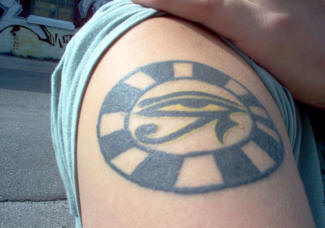
Tattoo © BMEZINE.com and Shannon Larratt
The EYE OF HORUS has a very specific meaning. The eye is represented as a figure with 6 parts. These 6 parts correspond to the six senses - Touch, Taste, Hearing, Thought, Sight, Smell. These are the 6 parts of the *eye*. The eye is the receptor of *input*. It has these six doors, to receive data.
The construction of the eye follows very precise laws. The senses are ordered according to their importance. And according to how much energy must be *eaten* by the *eye* for an individual to receive a particular sensation. All of the sensory data input is *food*.
In the Ancient Egyptian measurement system, the EYE OF HORUS represented a fractional quantification system to measure parts of a whole. [Get a book on Egyptian stuff or scan the internet for Egyptian Math see for e.g. "Understanding Hieroglyphs" by H. Wilson, ISBN 0-8442-4604-2]
The entire eye measured 1 heqat. And each of the parts of the eye measured fractions of the heqat.
[ THE EYE OF HORUS ]
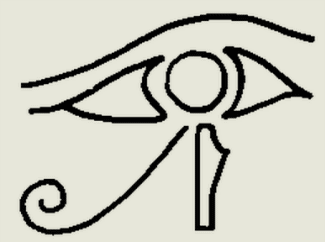
These are the parts of the EYE and their corresponding associated fraction values :-
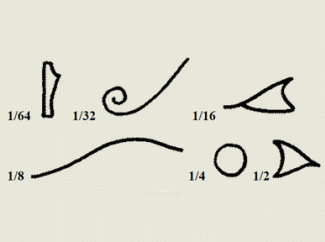
The corresponding sense data are :-
1/64 heqat Touch
1/32 heqat Taste
1/16 heqat Hearing
1/8 heqat Thought
1/4 heqat Sight
1/2 heqat Smell
Also, in the Egyptian system there is the unit of the ro. And by definition 320 ro = 1 heqat. The symbol for the ro is the mouth, it represented one mouthful. Again associating these measures with food, or input data.
Now if we consider the ro as the smallest unit of input energy needed for the input to *register* as sense data. We note, 320 = 5 x 64 and so in terms of ro we have 5 ro to register a Touch, 10 ro to register a Taste, 20 ro to register a Sound, 40 ro to register a Thought, 80 ro to register a Light, 160 ro to register a Smell.
To see how the drawings of the eye correspond to the various senses note:-
1. Touch 1/64 heqat or 5 ro
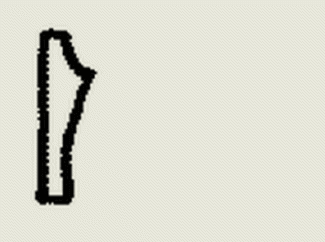
This part of the EYE represents planting a stick into the ground. Like planting a stalk that will take root. The Earth represents touch. Planting itself represents physical contact and touching.
2. Taste 1/32 heqat or 10 ro
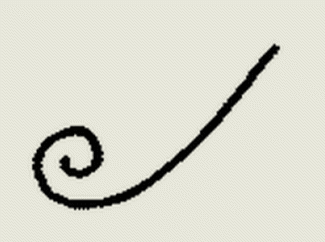
This part of the EYE represents the sprouting of the wheat or grain from the planted stalk. It is the food we put into our mouth. And so represents taste. Taste is also = Touch + Shape. That is to say, the different tastes we experience come from touching different shapes. So, touch is more a fundamental sense that taste.
3. Hearing 1/16 heqat or 20 ro
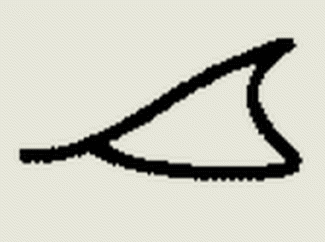
This part of the EYE represents the EAR. The figure points towards the ear on the face. Also, it has the shape of a horn or musical instrument. When we Hear a sound or combination of sounds we find this to be pleasing or unpleasant. The sound has a taste for us, causing a preference. Sound requires Touch + Taste and so is a combination of the lower senses.
4. Thought 1/8 heqat or 40 ro
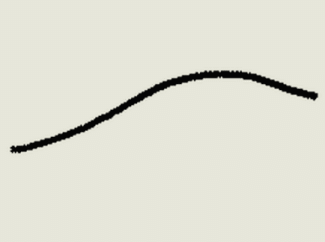
This part of the EYE represents thought. We often use our eyebrows to express our thoughts. And this facial feature is closest to that part of the forehead we associate with thinking. We raise our eyebrows to express surprise, for example. Thought = Touch + Taste + Hearing. If you think
5. Sight 1/4 heqat or 80 ro
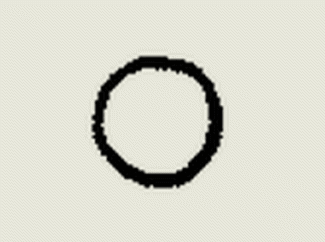
This is the pupil of the EYE. And so no more needs to be said. It represents seeing, or the sensation of light.
6. Smell 1/2 heqat or 160 ro
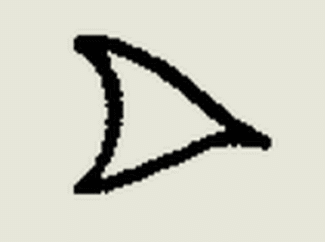
This part of the EYE points to the nose. It even looks like a nose. It represents the sensation of smell.
There is a lot more to this analysis, but that's the basics.
